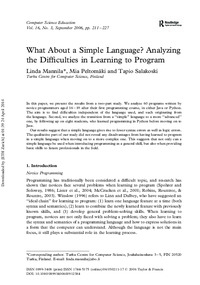What about a simple language?Analyzing the difficulties in learning to program
Linda Mannila, Mia Peltomäki, Tapio Salakoski
Publikationsdatum:
Zu finden in: Computer Science Education 3/2006 (Seite 211 bis 227), 2006
|
 |
 Diese Seite wurde seit 2 Jahren inhaltlich nicht mehr aktualisiert.
Unter Umständen ist sie nicht mehr aktuell.
Diese Seite wurde seit 2 Jahren inhaltlich nicht mehr aktualisiert.
Unter Umständen ist sie nicht mehr aktuell.
 Zusammenfassungen
Zusammenfassungen
In this paper, we present the results from a two-part study. We analyze 60 programs written by
novice programmers aged 16 – 19 after their first programming course, in either Java or Python.
The aim is to find difficulties independent of the language used, and such originating from
the language. Second, we analyze the transition from a ‘‘simple’’ language to a more ‘‘advanced’’
one, by following up on eight students, who learned programming in Python before moving on to
Java.
Our results suggest that a simple language gives rise to fewer syntax errors as well as logic errors. The qualitative part of our study did not reveal any disadvantages from having learned to program in a simple language when moving on to a more complex one. This suggests that not only can a simple language be used when introducing programming as a general skill, but also when providing basic skills to future professionals in the field.
Von Linda Mannila, Mia Peltomäki, Tapio Salakoski im Journal Computer Science Education 3/2006 im Text What about a simple language? (2006) auf Seite 77Our results suggest that a simple language gives rise to fewer syntax errors as well as logic errors. The qualitative part of our study did not reveal any disadvantages from having learned to program in a simple language when moving on to a more complex one. This suggests that not only can a simple language be used when introducing programming as a general skill, but also when providing basic skills to future professionals in the field.
 Dieser wissenschaftliche Zeitschriftenartikel erwähnt ...
Dieser wissenschaftliche Zeitschriftenartikel erwähnt ...
 Personen KB IB clear | Caitlin Kelleher , Randy Pausch , Anthony Robins , Guido van Rossum , Janet Rountree , Nathan Rountree , Martina Schollmeyer | |||||||||||||||||||||||||||||||||||||||||||||
 Aussagen KB IB clear | Programmieren ist schwierig | |||||||||||||||||||||||||||||||||||||||||||||
 Begriffe KB IB clear | Java
,  Programmieren Programmieren programming
, Python
, Syntax programming
, Python
, Syntax
| |||||||||||||||||||||||||||||||||||||||||||||
 Bücher |
| |||||||||||||||||||||||||||||||||||||||||||||
 Texte |
|
 Dieser wissenschaftliche Zeitschriftenartikel erwähnt vermutlich nicht ...
Dieser wissenschaftliche Zeitschriftenartikel erwähnt vermutlich nicht ... 
 Nicht erwähnte Begriffe | Semantik |
 Zitationsgraph
Zitationsgraph
 Zitationsgraph (Beta-Test mit vis.js)
Zitationsgraph (Beta-Test mit vis.js)
 3 Erwähnungen
3 Erwähnungen 
- Koli Calling 2006 - 6th Baltic Sea Conference on Computing Education Research, Koli Calling, Baltic Sea '06, Koli, Joensuu, Finland, November 9-12, 2006 (Anders Berglund, Mattias Wiggberg) (2006)
- An objective comparison of languages for teaching introductory programming (Linda Mannila, Michael de Raadt) (2006)


- An objective comparison of languages for teaching introductory programming (Linda Mannila, Michael de Raadt) (2006)
- SIGCSE 2010 - Proceedings of the 41st ACM technical symposium on Computer science education, SIGCSE 2010, Milwaukee, Wisconsin, USA, March 10-13, 2010 (Gary Lewandowski, Steven A. Wolfman, Thomas J. Cortina, Ellen Lowenfeld Walker) (2009)
- How programming environment shapes perception, learning and goals - logo vs. Scratch (Colleen M. Lewis) (2010)


- How programming environment shapes perception, learning and goals - logo vs. Scratch (Colleen M. Lewis) (2010)
- ICER 2020 - International Computing Education Research Conference, Virtual Event, New Zealand, August 10-12, 2020 (Anthony V. Robins, Adon Moskal, Amy J. Ko, Renée McCauley) (2020)
- Hedy - A Gradual Language for Programming Education (Felienne Hermans) (2020)


- Hedy - A Gradual Language for Programming Education (Felienne Hermans) (2020)
 Anderswo finden
Anderswo finden
 Volltext dieses Dokuments
Volltext dieses Dokuments
 |  What about a simple language? Analyzing the difficulties in learning to program: Artikel als Volltext ( What about a simple language? Analyzing the difficulties in learning to program: Artikel als Volltext ( : :  , 883 kByte; , 883 kByte;  : :  2020-11-28) 2020-11-28) |
 Anderswo suchen
Anderswo suchen 
 Beat und dieser wissenschaftliche Zeitschriftenartikel
Beat und dieser wissenschaftliche Zeitschriftenartikel
Beat hat Dieser wissenschaftliche Zeitschriftenartikel während seiner Zeit am Institut für Medien und Schule (IMS) ins Biblionetz aufgenommen. Beat besitzt kein physisches, aber ein digitales Exemplar. Eine digitale Version ist auf dem Internet verfügbar (s.o.). Es gibt bisher nur wenige Objekte im Biblionetz, die dieses Werk zitieren.











 Biblionetz-History
Biblionetz-History